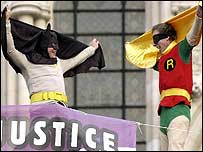Why 'dads army' is stepping up the fight
11 February, 2004
BBC News Online
 Marching on London in October 2003
Marching on London in October 2003Protesters dressed as superheroes bringing traffic to a standstill has become a more common sight, thanks to fathers' rights campaigners. But is anyone listening to them?
Superheroes closed Bristol's Clifton Suspension Bridge to traffic last week, as their comrades in costumes protested on gantries over key roads across London. Before Christmas, an army of militant Santas marched on Parliament, trying to make their presence felt. These are protesters who are determined to get noticed.
Fathers-4-Justice, the group behind the demonstrations, is planning an escalation of activity as part of a national campaign of civil disruption, as it tries to make people take notice of what is driving them to such lengths and heights.
The group knows that protesters are running the risk of imprisonment but says its tactics are a "last resort", that its frustrated members have "exhausted every possible avenue".
"We are a bunch of guys who are going to be making some pretty scary sacrifices. We know many of us are going to go to prison but there is tremendous resolve," says F4J founder Matt O'Connor. "It comes down to the simple fact that we face a Herculean struggle. The politicians are not dealing with this with the degree of urgency this matter deserves."
Mr O'Connor says fathers have been fighting "a steady erosion" of their rights for 30 years, without success. F4J's own meetings with the government in the 14 months since it started have, he says, proved fruitless.
The politicians are not dealing with this with the urgency it deserves
F4J founder Matt O'Connor
"It is now at the point where we have to fight for basic rights. So many people have lost contact with their children through the courts, it was inevitable something like Fathers-4-Justice was going to emerge," Mr O'Connor says.
He believes the group has already achieved considerable success in its first aim of raising awareness of a problem that has "gone unnoticed and unreported". There have been 1,300 applications within the last week to join F4J's 5,000-strong ranks, which indicates someone is paying attention.
But F4J's second aim is a tougher proposition - it wants an overhaul of family law within two years.
Orders not enforced
Figures show that mothers gain custody in four out of five disputes - F4J believes that 40% of fathers subsequently lose contact with their children within two years. Mr O'Connor says some of these cases will be due to fathers turning their backs, but he claims that the "vast majority" are due to mothers denying access.
Family courts issue contact orders in an attempt to ensure access for the parent not living with their children, but Mr O'Connor says these are worthless because they are not enforced.
 Heroes to some, a nuisance to others
Heroes to some, a nuisance to others"People have complete carte blanche to stop contact, knowing that the judge will do absolutely nothing about it," he says.
The government admits that the enforcement of contact orders is "an issue" that needs to be addressed. A Department of Constitutional Affairs (DCA) spokesman says "courts are understandably reluctant to impose jail terms or fines on mothers who have children to look after".
But F4J believes the solution is to give parents and grandparents "a legal right to see their children and grandchildren".
"The law says you have no legal right to see your children - only a right to apply to a court to see them - but you have a legal obligation to pay for them," says Mr O'Connor. Fathers are forced to support children even when mothers are not being forced to allow those fathers access, he says.
Mediation schemes
But F4J's claims are disputed by family support group One Parent Families, which says there is no way they can know how often mothers deny fathers' rights because there are simply no reliable facts and figures.
A One Parent Families spokesman says the charity receives 25,000 calls a year and that "one of the most common complaints is that mothers desperately want their children to have contact with their father and they have difficulty maintaining that".
 Militant Santas make their point
Militant Santas make their pointIn any case, court orders are only a small part of the overall picture. The DCA says that in more than 90% of break-ups involving children, custody arrangements are agreed outside the courts. Constitutional Affairs Secretary Lord Falconer is, however, considering the issue of custody disputes and hopes to make proposals within a matter of months.
"We are keen to keep couples who split up away from the courts," the DCA spokesman said. "It is not the best way of solving custody disputes. Family courts have an adversarial process that leads to more tension. Plus it is always a longer process.
"What we intend to do is introduce schemes to encourage parents to mediate more, with the help of experts, and come to their own arrangements. Orders agreed by parents themselves are more likely to be adhered to."
http://news.bbc.co.uk/1/hi/magazine/3475979.stmRELATED INTERNET LINKS: